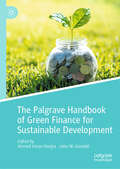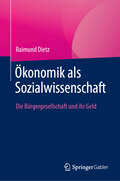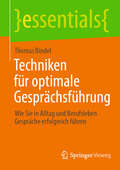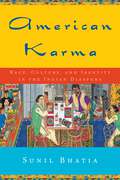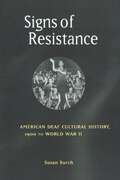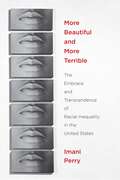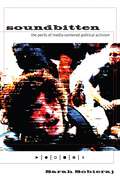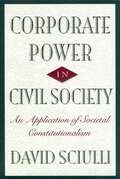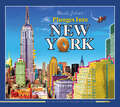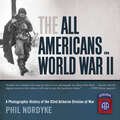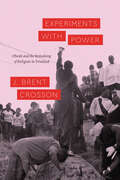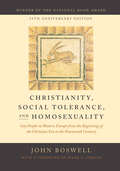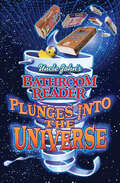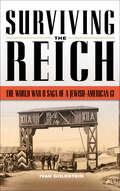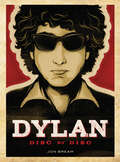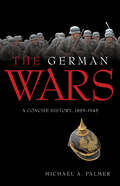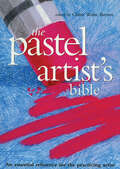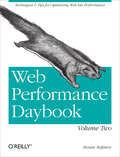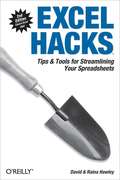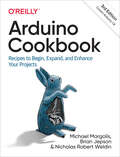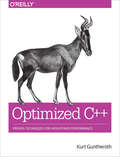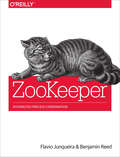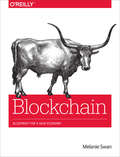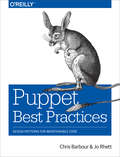- Table View
- List View
The Palgrave Handbook of Green Finance for Sustainable Development (Palgrave Studies in Impact Finance)
by Ahmed Imran Hunjra John W. GoodellThis book covers green finance with a focus on the environmental, social, and governance (ESG) consequences of green financing and its role in attaining sustainable development and a carbon-neutral economy. It provides research-based practical solutions for sustainable development, as well as insights from green finance, presenting a framework for studying green finance in the domains of accounting, banking, investing, and insurance. Of interest to academics, investors, and policymakers in green finance and development and alternative financing, the book features a global cast of contributors from both academia and practice.
Ökonomik als Sozialwissenschaft: Die Bürgergesellschaft und ihr Geld
by Raimund DietzIn diesem Buch wird eine integrale Theorie der modernen Gesellschaft mit Tausch und Geld als zentrale Elemente entwickelt. Die vorgeschlagene Theorie ermöglicht einen neuen, radikalen Blick auf das, was Gesellschaft, Wirtschaft und vor allem Geld ist. Der Autor baut seine Theoriearchitektur Schritt für Schritt auf. Er klärt den Gesellschaftsbegriff und trifft die grundlegende Unterscheidung von Tausch und Pooling. Dann setzt er sich mit den Werttheorien der klassischen und neoklassischen Ökonomie auseinander und schlägt vor, diese durch eine Theorie der Wertformen zu ersetzen. Schließlich führt er die höchst unterschiedlichen Auffassungen und Theorien über Geld und seine Funktionen zu einem neuen, ganzheitlichen Ansatz zusammen. Das Buch richtet sich an alle, denen es um eine integrale Sicht auf Wirtschaft und Gesellschaft und deren nachhaltige Gestaltung geht.
Atlas of Radiology in Pediatric Kidney Disorders
by Sidharth Kumar Sethi Rupesh Raina Vivek Sharma Hui Kim YapThis book covers all forms of imaging in pediatric nephrology incorporating all radiologic modalities and imaging of pediatric kidney disorders. It covers from antenatal to post-natal imaging of kidney of a child, starting from normal to abnormal imaging and latest evidence based approach. Chapters cover all forms of abnormalities including cysts, neoplasms, infections, acute kidney injury and chronic kidney disease. The book includes chapter on basics of radiology in children, how to avoid radiation, and point of care ultrasound in pediatric intensive care among others. The editors and authors are leading experts in pediatric nephrology and pediatric radiology from across the world. The editors mentor pediatric nephrology sessions at multiple avenues across the world and therefore the book incorporates all the latest protocols. The book is relevant for radiologists, pediatric radiologists, pediatricians, pediatric nephrologists, adult nephrologists, fellows in nephrology and radiology. It also meets the curriculum requirements of fellowship training in nephrology and pediatric nephrology.
Techniken für optimale Gesprächsführung: Wie Sie in Alltag und Berufsleben Gespräche erfolgreich führen (essentials)
by Thomas BindelThomas Bindel schlägt Ihnen vor, mit welchen Worten Sie in schwierigen Situationen richtig reagieren. Er verrät Ihnen, mit welcher Systematik Sie Gespräche und Verhandlungen perfekt vorbereiten. Und er zeigt Ihnen, wie Sie mit Menschen vertieft ins Gespräch kommen, indem Sie besser zuhören und treffende Fragen stellen. Das vorliegende Buch bietet somit ein Konzentrat aus den wichtigsten Methoden, um Gespräche optimal führen zu können: Ausgestattet mit dem Erfolgsprinzip eines amerikanischen Präsidenten, diversen Denkhüten, passenden Strategien und Techniken für Gesprächsvorbereitung, -führung sowie -nachbereitung übersteht man die Begegnung mit dem Freud&’schen Eisberg und findet so zu einer Kommunikation, die durch ein Quadrat runder läuft und gewaltfrei mehr erreicht.
American Karma: Race, Culture, and Identity in the Indian Diaspora (Qualitative Studies in Psychology #11)
by Sunil BhatiaThe Indian American community is one of the fastest growing immigrant communities in the U.S. Unlike previous generations, they are marked by a high degree of training as medical doctors, engineers, scientists, and university professors.American Karma draws on participant observation and in-depth interviews to explore how these highly skilled professionals have been inserted into the racial dynamics of American society and transformed into “people of color.” Focusing on first-generation, middle-class Indians in American suburbia, it also sheds light on how these transnational immigrants themselves come to understand and negotiate their identities.Bhatia forcefully contends that to fully understand migrant identity and cultural formation it is essential that psychologists and others think of selfhood as firmly intertwined with sociocultural factors such as colonialism, gender, language, immigration, and race-based immigration laws.American Karma offers a new framework for thinking about the construction of selfhood and identity in the context of immigration. This innovative approach advances the field of psychology by incorporating critical issues related to the concept of culture, including race, power, and conflict, and will also provide key insights to those in anthropology, sociology, human development, and migrant studies.
Signs of Resistance: American Deaf Cultural History, 1900 to World War II (History of Disability)
by Susan BurchChoice Outstanding Academic Title 2003A reinterpretation of early 20th century Deaf history, with sign language at its center During the nineteenth century, American schools for deaf education regarded sign language as the "natural language" of Deaf people, using it as the principal mode of instruction and communication. These schools inadvertently became the seedbeds of an emerging Deaf community and culture. But beginning in the 1880s, an oralist movement developed that sought to suppress sign language, removing Deaf teachers and requiring deaf people to learn speech and lip reading. Historians have all assumed that in the early decades of the twentieth century oralism triumphed overwhelmingly. Susan Burch shows us that everyone has it wrong; not only did Deaf students continue to use sign language in schools, hearing teachers relied on it as well. In Signs of Resistance, Susan Burch persuasively reinterprets early twentieth century Deaf history: using community sources such as Deaf newspapers, memoirs, films, and oral (sign language) interviews, Burch shows how the Deaf community mobilized to defend sign language and Deaf teachers, in the process facilitating the formation of collective Deaf consciousness, identity and political organization.
More Beautiful and More Terrible: The Embrace and Transcendence of Racial Inequality in the United States
by Imani PerryPerry argues that racism in America has moved into a new phase--post-intentionalFor a nation that often optimistically claims to be post-racial, we are still mired in the practices of racial inequality that plays out in law, policy, and in our local communities. One of two explanations is often given for this persistent phenomenon: On the one hand, we might be hypocritical—saying one thing, and doing or believing another; on the other, it might have little to do with us individually but rather be inherent to the structure of American society.More Beautiful and More Terrible compels us to think beyond this insufficient dichotomy in order to see how racial inequality is perpetuated. Imani Perry asserts that the U.S. is in a new and distinct phase of racism that is “post-intentional”: neither based on the intentional discrimination of the past, nor drawing upon biological concepts of race. Drawing upon the insights and tools of critical race theory, social policy, law, sociology and cultural studies, she demonstrates how post-intentional racism works and maintains that it cannot be addressed solely through the kinds of structural solutions of the Left or the values arguments of the Right. Rather, the author identifies a place in the middle—a space of “righteous hope”—and articulates a notion of ethics and human agency that will allow us to expand and amplify that hope.To paraphrase James Baldwin, when talking about race, it is both more terrible than most think, but also more beautiful than most can imagine, with limitless and open-ended possibility. Perry leads readers down the path of imagining the possible and points to the way forward.
Soundbitten: The Perils of Media-Centered Political Activism
by Sarah SobierajThere is an elaborate and often invisible carnival that emerges alongside presidential campaigns as innumerable activist groups attempt to press their issues into mainstream political discourse. Sarah Sobieraj’s fascinating ethnographic portrait of fifty diverse organizations over the course of two campaign cycles reveals that while most activist groups equate political success with media success and channel their energies accordingly, their efforts fail to generate news coverage and come with deleterious consequences. Sobieraj shows that activists’ impact on public political debates is minimal, and carefully unravels the ways in which their all-consuming media work and unrelenting public relations approach undermine their ability to communicate with pedestrians, comes at the expense of other political activities, and perhaps most perniciously, damages the groups themselves.Weaving together fieldwork, news analysis, and in-depth interviews with activists and journalists, Soundbitten illuminates the relationship between news and activist organizations. This captivating portrait of activism in the United States lays bare the challenges faced by outsiders struggling to be heard in a mass media dominated public sphere that proves exclusionary and shows that media-centrism is not only ineffective, but also damaging to group life. Soundbitten reveals why media-centered activism so often fails, what activist groups lose in the process, and why we should all be concerned.
Corporate Power in Civil Society
by David SciulliThe corporate mega-mergers of the 1980s and 1990s raise many troubling questions for social scientists and legal scholars. Do corporate globalism and the new, streamlined corporation help or hinder the development of civil society? Does the new power that increasingly deregulated businesses wield undermine the rights of citizens, or is this threat being exaggerated? Who has the authority to get things done in a corporation's name and who can be held legally responsible for a corporation's misbehavior? What role, if any, should the courts play in strengthening the rights of individuals who challenge the actions of big business? David Sciulli maps the legal limits of corporate power in our democratic society, and explores the role of the corporate judiciary in creating public policy. He argues that the judiciary must be more vigilant and act to curb corporate abuses. He demonstrates that when corporations exercise their private power in civil society, they are just as capable as the state of exercising it in ways that are dangerous, arbitrary, and challenge the basic institutional arrangements of society. Finally, Sciulli calls for sociologists to involve themselves more deeply in issues of corporate governance and commit their discipline to influencing the decisions of the courts.
Uncle John's Plunges into New York: Illustrated Edition (Uncle John's Illustrated Ser.)
by Bathroom Readers' InstituteFrom the number one source of bathroom reading, an illustrated guide to trivia surrounding the City That Never Sleeps. You think you know New York? Fugeddaboutit! Uncle John takes you on a whirlwind tour of the greatest place on Earth! Discover fascinating history, odd facts, and the unique people who make New York the Big Apple of the world&’s eye. Read all about . . . · UFOs visit the Empire State · What ever happened to Crazy Eddie? · The history of bagels & The New Yorker · The Kingdom of Zog & other lost landmarks · New York&’s grumpiest tourist: Charles Dickens · Could you pass the Ellis Island immigration test? · The New York Times crossword puzzle goofs · The Borscht Belt comedians · The incredible natural phenomenon known as Manhattanhenge · The public library, the subway, and the city&’s narrowest house · The Naked Cowboy and Lady Liberty&’s big feet · People who actually tried to sell the Brooklyn Bridge · No soup for you! And much more
The All Americans in World War II: A Photographic History of the 82nd Airborne Division at War
by Phil NordykeContaining “close to every photograph ever taken of the 82nd . . . Anyone with the slightest interest in the airborne will want to own this handsome volume” (WWII History magazine).On the night of July 9/10, 1943 the All Americans of the 82nd Airborne Division jumped into history as they made their first parachute assault of World War II. Three others would follow: Salerno, Normandy, and Holland. In total the division served more than three hundred days in combat, a record unmatched by any other American division.With nearly four hundred historic photographs, many never before published, The All Americans in World War II provides a complete photographic history of the 82nd Airborne Division as it fought its way across Sicily, Italy, France, Belgium, and Germany, ultimately all the way to Berlin as part of the American occupation forces. This book is an essential addition to any serious World War II collection and a tribute to the fighting spirit of this legendary division.“Nordyke has assembled a fresh look at the All-Americans that any U.S. WWII enthusiast should consider to be a ‘high priority purchase.’” —Military Trader“A must-own if you are interested in US Airborne operations in Europe . . . great photos, great maps, and great narrative.” —Military History online
Experiments with Power: Obeah and the Remaking of Religion in Trinidad (Class 200: New Studies in Religion)
by J. Brent CrossonIn 2011, Trinidad declared a state of emergency. This massive state intervention lasted for 108 days and led to the rounding up of over 7,000 people in areas the state deemed “crime hot spots.” The government justified this action and subsequent police violence on the grounds that these measures were restoring “the rule of law.” In this milieu of expanded policing powers, protests occasioned by police violence against lower-class black people have often garnered little sympathy. But in an improbable turn of events, six officers involved in the shooting of three young people were charged with murder at the height of the state of emergency. To explain this, the host of Crime Watch, the nation’s most popular television show, alleged that there must be a special power at work: obeah. From eighteenth-century slave rebellions to contemporary responses to police brutality, Caribbean methods of problem-solving “spiritual work” have been criminalized under the label of “obeah.” Connected to a justice-making force, obeah remains a crime in many parts of the anglophone Caribbean. In Experiments with Power, J. Brent Crosson addresses the complex question of what obeah is. Redescribing obeah as “science” and “experiments,” Caribbean spiritual workers unsettle the moral and racial foundations of Western categories of religion. Based on more than a decade of conversations with spiritual workers during and after the state of emergency, this book shows how the reframing of religious practice as an experiment with power transforms conceptions of religion and law in modern nation-states.
Christianity, Social Tolerance, and Homosexuality: Gay People in Western Europe from the Beginning of the Christian Era to the Fourteenth Century
by John Boswell“What makes this work so exciting is not simply its content . . . but its revolutionary challenge to . . . Western culture’s most familiar moral assumptions.” —NewsweekJohn Boswell’s National Book Award–winning study of the history of attitudes toward homosexuality in the early Christian West was a groundbreaking work that challenged preconceptions about the Church’s past relationship to its gay members—among them priests, bishops, and even saints—when it was first published thirty-five years ago. The historical breadth of Boswell’s research (from the Greeks to Aquinas) and the variety of sources consulted make this one of the most extensive treatments of any single aspect of Western social history.Now in this thirty-fifth anniversary edition with a new foreword by leading queer and religious studies scholar Mark D. Jordan, Christianity, Social Tolerance, and Homosexuality is still fiercely relevant. This landmark book helped form the disciplines of gay and gender studies, and it continues to illuminate the origins and operations of intolerance as a social force.“Truly groundbreaking work. Boswell reveals unexplored phenomena with an unfailing erudition.” —Michel Foucault“Revolutionary. . . .sets a standard of excellence that one would have thought impossible in the treatment of an issue so large, uncharted and vexed. . . . Improbably as it might seem, this work of unrelenting scholarship and high intellectual drama is also thoroughly entertaining.” —New York Times Book Review“One day, when all churches accept the presence and achievements of gay people with approbation instead of denial or disapproval, Boswell will in no small way be responsible.” —Gay & Lesbian Review
Uncle John's Bathroom Reader Plunges into the Universe (Uncle John's Bathroom Reader)
by Bathroom Readers' InstituteAn entertaining trivia compendium flush with fun facts about all things science.Uncle John&’s Bathroom Reader Plunges into the Universe is your anecdote to boring science textbooks. Uncle John and his loony lab partners will take you back to the Big Bang and forward to the distant future. You&’ll see the science in everything around (and inside) you, and learn the truth about the most egregious science myths (such as—you can&’t &“sweat like a pig&” because pigs don&’t sweat). How many amazing facts await your visual cortex in these 494 pages made up of atoms (print version) or bits and bytes (e-book)? As Carl Sagan would have said, &“Billions and Billions!&” So put on your thinking cap and check out: · Pluto denied · Kitchen chemistry · Football gets physics-al · Planet Earth&’s sudden hot flashes · Food&’s incredible journey . . .through you · The science of surfing, skating, and snowboarding · How they plugged the hole in the ozone layer · How &“defenseless&” animals stay alive · Sci-fi that&’s more fi than sci · Ancient astronomers · Know your clouds And much, much more
Surviving the Reich: The World War II Saga of a Jewish-American GI
by Ivan GoldsteinThe memoirs of a Jewish-American soldier who is taken as a POW by the Germans and survives against all odds.Ivan Goldstein was a nineteen-year-old green-as-grass soldier heading into his first battle: the Battle of the Bulge, World War II’s fiercest engagement between the American army and Hitler’s army. A bow gunner on a Sherman tank, Private Goldstein was only hours into his first battle when his tank was hit by an enemy shell, and he was almost killed. Goldstein escapes with his life . . . only to be captured by the Germans. This could be the story of many young men from what has rightly been called “the Greatest Generation,” but Goldstein is not any young man. He is an American Jew. And when a German officer learns this, the officer says, “In the morning, take the Jew out and shoot him.” What follows is an epic story of survival in the face of seemingly insurmountable odds that is sure to engage everyone interested in the war against the Third Reich.
Dylan: Disc by Disc
by Jon BreamListen to every side: “Gorgeously rendered. . . . a unique spin on the discography.” —BooklistCovering each of Bob Dylan’s thirty-six studio LPs, this book brings rock ‘n’ roll musicians, songwriters, and critics together to sound off about each release, discussing and debating not only Dylan’s extraordinary musical accomplishments but the factors in his life that influenced his musical expressions. Beautifully illustrated with LP art and period photography, as well as performance and candid backstage images, the book also contains liner notes-like details about the recordings and session musicians, and provides context and perspective on Dylan’s career—in a one-of-a-kind retrospective of the life and music of an American legend.Commentators include Questlove of the Roots and the Tonight Show with Jimmy Fallon, Rodney Crowell, Jason Isbell, Suzanne Vega, Ric Ocasek of the Cars, Wesley Stace (aka John Wesley Harding), longtime Dylan pal Eric Andersen and Minnesota musicians Tony Glover and Kevin Odegard, both of whom have been in the studio with Dylan. Other well-known voices in Dylan: Disc by Disc include Robert Christgau, Anthony DeCurtis, Alan Light, Joe Levy, Holly George-Warren, Joel Selvin, Jim Fusilli, Geoffrey Himes, Charles R. Cross, and David Browne, among others.
The German Wars: A Concise History, 1859–1945
by Michael A. Palmer“A fine survey of how a nation came to be recognized for its military supremacy—despite losing two world wars.” —Midwest Book ReviewIn the decades leading up to World War II, the world was in awe of the Prussian-German military, seeking to emulate what esteemed German military history scholar Robert M. Citino has termed “the German Way of War.” Military professionals around the globe became fluent in the tactical jargon: bewegungskrieg, schwerpunckt, auftragstaktik, fingerspitzengefuhl, and of course, blitzkrieg. At the same time, German warfare would become closely associated with the bloodiest and cruelest era in the history of mankind. The German Wars: A Concise History, 1859–1945 outlines the history of European warfare from the Wars of German Unification to the end of World War II. Author Michael A. Palmer looks at political, social, economic, and military developments across Europe and the United States during this crucial period in world history in order to demonstrate the lasting impact of the German Wars on the modern age.“Palmer has succeeded in creating an outstanding short history of the German wars that influenced the development of Europe and the world in the 19th and 20th centuries. It’s a terrific introduction and overview of the subject.” —Armchair General“A provocative look at the methods that Germany used to wage war, and why ultimately they failed.” —Military Heritage“This is an excellent book . . . highly readable. It would be an excellent addition to the library of any military historian, public library, university library as well as personal collection of persons with interest in European or Trans-Atlantic History.” —Kepler’s Military History Book Reviews
The Pastel Artist's Bible: An Essential Reference for the Practicing Artist (Artist's Bibles Ser.)
by Claire Waite BrownA comprehensive guide to one of the most popular painting media—including materials, color, techniques, and subjects from still lifes to animals.Discover the unique joys of pastel painting with this easy-to-use guide to one of the most versatile and forgiving mediums. More than one hundred visual sequences reveal key techniques such as mixing, blending, scumbling, sgraffito, hatching and feathering. Includes tips on composing your painting, using color, adding highlights and shadows, and creating textured effects. Step-by-step demonstrations show how to approach a range of subjects from landscapes and flowers to portraits and still life. Over 65,000 copies sold worldwide.
Web Performance Daybook Volume 2: Techniques and Tips for Optimizing Web Site Performance
by Stoyan StefanovPerformance is critical to the success of any website, and help with using today’s new tools is key. In this remarkable guide, 32 leading web performance experts offer practical tips, techniques, and advice for optimizing your site’s user experience.Originally written for an online calendar, this collection of articles will inspire you to squeeze every ounce of performance from your site—whether you’re a web developer, mobile developer, or web designer. Check the table of contents and you’ll be convinced.In order of appearance, Web Performance Daybook authors include:Patrick MeenanNicholas ZakasGuy PodjarnyStoyan StefanovTim KadlecBrian PaneJosh FraserSteve SoudersBetty TsoIsrael NirMarcel DuranÉric DaspetAlois ReitbauerMatthew PrinceBuddy BrewerAlexander PodelkoEstelle WeylAaron PetersTony GentilcoreMatthew SteeleBryan McQuadeTobie LangelBilly HoffmanJoshua BixbySergey ChernyshevJP CastroPavel PaulauDavid CalhounNicole SullivanJames PearceTom Hughes-CroucherDave Artz
Excel Hacks: Tips & Tools for Streamlining Your Spreadsheets
by David Hawley Raina HawleyMillions of users create and share Excel spreadsheets every day, but few go deeply enough to learn the techniques that will make their work much easier. There are many ways to take advantage of Excel's advanced capabilities without spending hours on advanced study. Excel Hacks provides more than 130 hacks -- clever tools, tips and techniques -- that will leapfrog your work beyond the ordinary.Now expanded to include Excel 2007, this resourceful, roll-up-your-sleeves guide gives you little known "backdoor" tricks for several Excel versions using different platforms and external applications. Think of this book as a toolbox. When a need arises or a problem occurs, you can simply use the right tool for the job. Hacks are grouped into chapters so you can find what you need quickly, including ways to:Reduce workbook and worksheet frustration -- manage how users interact with worksheets, find and highlight information, and deal with debris and corruption.Analyze and manage data -- extend and automate these features, moving beyond the limited tasks they were designed to perform.Hack names -- learn not only how to name cells and ranges, but also how to create names that adapt to the data in your spreadsheet.Get the most out of PivotTables -- avoid the problems that make them frustrating and learn how to extend them.Create customized charts -- tweak and combine Excel's built-in charting capabilities.Hack formulas and functions -- subjects range from moving formulas around to dealing with datatype issues to improving recalculation time.Make the most of macros -- including ways to manage them and use them to extend other features.Use the enhanced capabilities of Microsoft Office 2007 to combine Excel with Word, Access, and Outlook.You can either browse through the book or read it from cover to cover, studying the procedures and scripts to learn more about Excel. However you use it, Excel Hacks will help you increase productivity and give you hours of "hacking" enjoyment along the way.
Arduino Cookbook: Recipes to Begin, Expand, and Enhance Your Projects (Oreilly And Associate Ser.)
by Brian Jepson Michael Margolis Nicholas Robert WeldinWant to create devices that interact with the physical world? This cookbook is perfect for anyone who wants to experiment with the popular Arduino microcontroller and programming environment. You’ll find more than 200 tips and techniques for building a variety of objects and prototypes such as IoT solutions, environmental monitors, location and position-aware systems, and products that can respond to touch, sound, heat, and light.Updated for the Arduino 1.8 release, the recipes in this third edition include practical examples and guidance to help you begin, expand, and enhance your projects right away—whether you’re an engineer, designer, artist, student, or hobbyist.Get up to speed on the Arduino board and essential software concepts quicklyLearn basic techniques for reading digital and analog signalsUse Arduino with a variety of popular input devices and sensorsDrive visual displays, generate sound, and control several types of motorsConnect Arduino to wired and wireless networksLearn techniques for handling time delays and time measurementApply advanced coding and memory-handling techniques
Optimized C++: Proven Techniques for Heightened Performance
by Kurt GuntherothIn today’s fast and competitive world, a program’s performance is just as important to customers as the features it provides. This practical guide teaches developers performance-tuning principles that enable optimization in C++. You’ll learn how to make code that already embodies best practices of C++ design run faster and consume fewer resources on any computer—whether it’s a watch, phone, workstation, supercomputer, or globe-spanning network of servers.Author Kurt Guntheroth provides several running examples that demonstrate how to apply these principles incrementally to improve existing code so it meets customer requirements for responsiveness and throughput. The advice in this book will prove itself the first time you hear a colleague exclaim, “Wow, that was fast. Who fixed something?”Locate performance hot spots using the profiler and software timersLearn to perform repeatable experiments to measure performance of code changesOptimize use of dynamically allocated variablesImprove performance of hot loops and functionsSpeed up string handling functionsRecognize efficient algorithms and optimization patternsLearn the strengths—and weaknesses—of C++ container classesView searching and sorting through an optimizer’s eyeMake efficient use of C++ streaming I/O functionsUse C++ thread-based concurrency features effectively
ZooKeeper: Distributed Process Coordination
by Flavio Junqueira Benjamin ReedBuilding distributed applications is difficult enough without having to coordinate the actions that make them work. This practical guide shows how Apache ZooKeeper helps you manage distributed systems, so you can focus mainly on application logic. Even with ZooKeeper, implementing coordination tasks is not trivial, but this book provides good practices to give you a head start, and points out caveats that developers and administrators alike need to watch for along the way.In three separate sections, ZooKeeper contributors Flavio Junqueira and Benjamin Reed introduce the principles of distributed systems, provide ZooKeeper programming techniques, and include the information you need to administer this service.Learn how ZooKeeper solves common coordination tasksExplore the ZooKeeper API’s Java and C implementations and how they differUse methods to track and react to ZooKeeper state changesHandle failures of the network, application processes, and ZooKeeper itselfLearn about ZooKeeper’s trickier aspects dealing with concurrency, ordering, and configurationUse the Curator high-level interface for connection managementBecome familiar with ZooKeeper internals and administration tools
Blockchain: Blueprint for a New Economy
by Melanie SwanBitcoin is starting to come into its own as a digital currency, but the blockchain technology behind it could prove to be much more significant. This book takes you beyond the currency ("Blockchain 1.0") and smart contracts ("Blockchain 2.0") to demonstrate how the blockchain is in position to become the fifth disruptive computing paradigm after mainframes, PCs, the Internet, and mobile/social networking.Author Melanie Swan, Founder of the Institute for Blockchain Studies, explains that the blockchain is essentially a public ledger with potential as a worldwide, decentralized record for the registration, inventory, and transfer of all assets—not just finances, but property and intangible assets such as votes, software, health data, and ideas.Topics include:Concepts, features, and functionality of Bitcoin and the blockchainUsing the blockchain for automated tracking of all digital endeavorsEnabling censorship?resistant organizational modelsCreating a decentralized digital repository to verify identityPossibility of cheaper, more efficient services traditionally provided by nationsBlockchain for science: making better use of the data-mining networkPersonal health record storage, including access to one’s own genomic dataOpen access academic publishing on the blockchainThis book is part of an ongoing O’Reilly series. Mastering Bitcoin: Unlocking Digital Crypto-Currencies introduces Bitcoin and describes the technology behind Bitcoin and the blockchain. Blockchain: Blueprint for a New Economy considers theoretical, philosophical, and societal impact of cryptocurrencies and blockchain technologies.
Puppet Best Practices: Design Patterns for Maintainable Code
by Jo Rhett Chris BarbourIf you maintain or plan to build Puppet infrastructure, this practical guide will take you a critical step further with best practices for managing the task successfully. Authors Chris Barbour and Jo Rhett present best-in-class design patterns for deploying Puppet environments and discuss the impact of each. The conceptual designs and implementation patterns in this book will help you create solutions that are easy to extend, maintain, and support.Essential for companies upgrading their Puppet deployments, this book teaches you powerful new features and implementation models that weren’t available in the older versions. DevOps engineers will learn how best to deploy Puppet with long-term maintenance and future growth in mind.Explore Puppet’s design philosophy and data structuresGet best practices for using Puppet’s declarative languageExamine Puppet resources in depth—the building blocks of state managementLearn to model and describe business and site-specific logic in PuppetSee best-in-class models for multitiered data management with HieraExplore available options and community experience for node classificationUtilize r10k to simplify and accelerate Puppet change managementReview the cost benefits of creating your own extensions to PuppetGet detailed advice for extending Puppet in a maintainable manner
